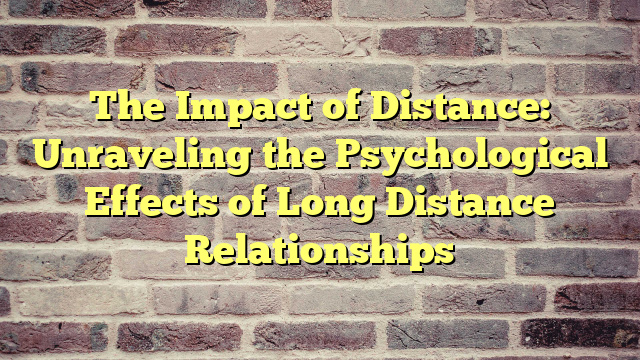The Impact of Distance: Unraveling the Psychological Effects of Long Distance Relationships
The Impact of Distance: Unraveling the Psychological Effects of Long Distance Relationships
Introduction
Long distance relationships have become increasingly common in today’s interconnected world. With the advancement of technology, it has become easier for people to connect with others who are geographically far away. However, despite the convenience, being in a long distance relationship can have significant psychological effects on individuals involved. This article aims to explore the impact of distance on the psychological well-being of individuals in long distance relationships.
The Challenges of Distance
Being physically separated from a partner can lead to a range of emotional challenges. One of the primary difficulties faced by individuals in long distance relationships is the feeling of loneliness. The absence of physical proximity and the inability to engage in everyday activities together can create a sense of isolation and emotional detachment.
Moreover, the lack of face-to-face communication can lead to misinterpretation of intentions and emotions. In a long distance relationship, much of the communication happens through text messages, phone calls, or video chats. This limited form of communication can make it difficult to accurately convey emotions, leading to misunderstandings and conflicts.
The Psychological Effects
The psychological effects of long distance relationships can vary from person to person. However, there are some common themes that emerge when examining the impact of distance on individuals’ well-being.
1. Increased Anxiety and Insecurity
Being physically separated from a partner can trigger feelings of anxiety and insecurity. The uncertainty of the future and the fear of losing the connection with the partner can lead to heightened levels of stress. Individuals may constantly worry about the fidelity of their partner or the longevity of the relationship.
2. Decreased Trust
Trust is a crucial component of any relationship, and distance can put it to the test. Without regular physical presence, individuals may find it challenging to trust their partner completely. Doubts and suspicions can arise, leading to a breakdown in trust and further exacerbating the psychological strain.
3. Emotional Rollercoaster
Long distance relationships often involve a rollercoaster of emotions. The highs of reunion and the joy of being together are contrasted with the lows of separation and longing. This emotional turbulence can take a toll on individuals’ mental well-being, leading to mood swings and emotional instability.
Coping Strategies
While long distance relationships can be challenging, there are several strategies that individuals can employ to mitigate the psychological effects of distance.
1. Effective Communication
Open and honest communication is vital in any relationship, but it becomes even more crucial in a long distance relationship. Regularly expressing feelings, discussing concerns, and maintaining transparency can help build trust and alleviate anxiety.
2. Establishing Boundaries
Setting clear boundaries and expectations can help manage the insecurities and uncertainties that distance brings. Discussing topics such as exclusivity, commitment, and future plans can provide a sense of stability and security.
3. Engaging in Shared Activities
Despite the physical distance, finding ways to engage in shared activities can help maintain a sense of connection. Watching movies together, playing online games, or even cooking the same recipe can create shared experiences and strengthen the bond between partners.
4. Practicing Self-Care
Self-care is essential in maintaining one’s mental well-being, especially in a long distance relationship. Engaging in activities that bring joy and fulfillment, such as hobbies, exercise, or spending time with friends and family, can help individuals cope with the challenges of distance.
The Future of Long Distance Relationships
As technology continues to advance, the future of long distance relationships may hold new possibilities. Virtual reality and augmented reality technologies have the potential to bridge the physical gap and provide a more immersive experience of being together.
Additionally, the COVID-19 pandemic has forced many couples into long distance relationships due to travel restrictions and lockdowns. This unprecedented situation has highlighted the resilience and adaptability of individuals in maintaining relationships despite the challenges of distance.
Conclusion
Long distance relationships can have a significant impact on individuals’ psychological well-being. The challenges of distance, such as loneliness and miscommunication, can lead to increased anxiety, decreased trust, and emotional instability. However, by employing effective communication, establishing boundaries, engaging in shared activities, and practicing self-care, individuals can mitigate the psychological effects of distance. As technology continues to evolve, the future of long distance relationships may hold new possibilities for maintaining a strong and fulfilling connection.

